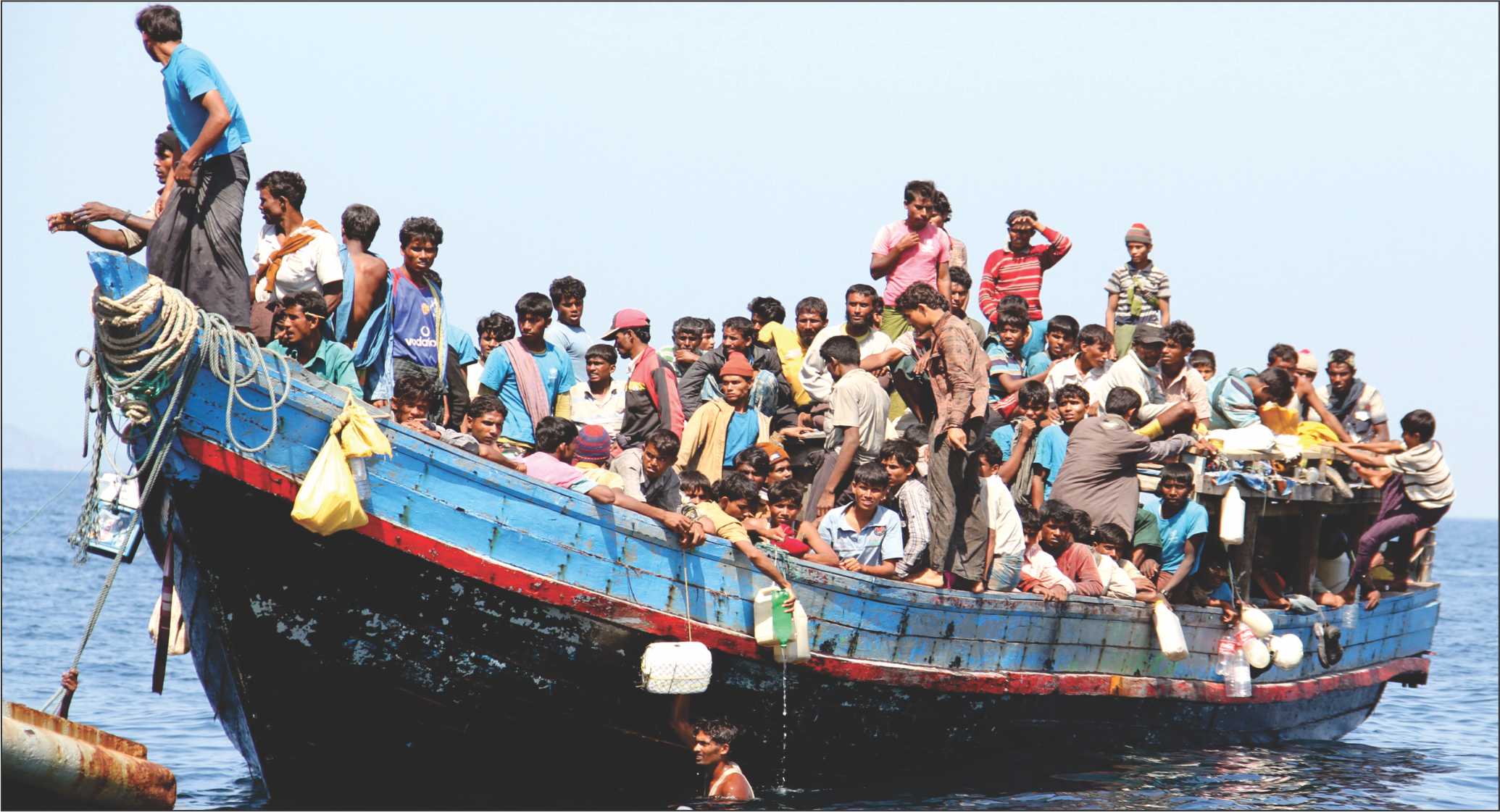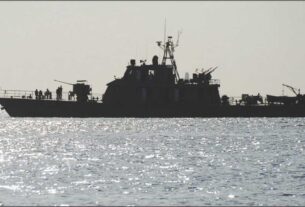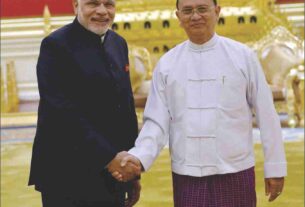Rohingya crisis and implications for regional stability
The issue of Rohingya Muslims in Myanmar is making headlines for quite some time but it is dangerously brewing a deadly cocktail in which outside intervention is becoming more likely and an armed militia could soon be formed to take revenge.
There are signs of radicalization among Rohingya youths who now view Myanmar military as repressive and unwilling to allow them to live peacefully in Myanmar.
Combined with foreign help and massive radicalization the issue may turn ugly in coming years if it is not handled with care and prudence.
The escalating military crackdown on Rohingya Muslims in northern Rakhine State, on Myanmar’s western border with Bangladesh, signifies the first major crisis for the fledgling government of State Counsellor Aung San Suu Kyi.
Of the myriad issues facing Suu Kyi, Rakhine-and related allegations of military abuses, displacement, destruction of villages and even “ethnic cleansing”-has the greatest potential to damage her international image and the country’s successful emergence on the world stage.
A sweeping operation to root out Muslim militants in northern Rakhine after October 9 attacks on police posts and subsequently on an army unit, is entering a deadly new phase.
The next stage could see harsh zoning plans and relocation of villages, under a revival of the military’s old “four cuts” strategy, developed in the 1970s to deny ethnic insurgents access to food, funds, information and recruitment.
The consequences, say military experts and analysts, could inflict further rights violations and hardship on local populations-as well as difficulties for relief agencies trying to support local populations cut off from food and medical supplies.
The initial phase could last “several months,” said one expert on Myanmar’s military. But the overall operation could go on for the next year, effectively giving the military full control of northern Rakhine-whether or not military leaders persuade Suu Kyi to support their call for the president to declare a state of emergency.
Despite widespread awareness of the military’s powerful role in Myanmar, the perception of official indifference or inability to curb the military’s Rakhine campaign could also embarrass donor governments and organizations-not least those involved with economic programs and development plans for the state.
Diplomats and others dealing with Naypyitaw officials note growing confusion in differentiating between positions taken by the military-which kept Suu Kyi under house arrest for more than 15 years-and civilian branches of government on issues concerning security.
Tense situation
This is particularly the case in discussions on humanitarian operations in Rakhine, as well as in Kachin and Shan states in the country’s north, amid intensifying clashes between government troops and ethnic armed groups.
In a belated acknowledgment of the seriousness of the situation, Suu Kyi took the unprecedented step of convening an informal meeting of foreign ministers of the Association of Southeast Asian Nations recently in Yangon, to brief them on Rakhine.
Another consideration, according to Myanmar officials, was to counter the contentious move by Malaysia’s Prime Minister Najib Razak to accuse Suu Kyi’s government of presiding over genocide of Rohingya Muslims, and his call to review Myanmar’s ASEAN membership.
At the meeting, Suu Kyi who is also foreign minister, told fellow ministers that Myanmar needed time, space and understanding to resolve the problems in Rakhine. Malaysia also proposed an independent investigation commission, but the meeting ended with no plans to directly involve ASEAN.
The real significance of the ASEAN meeting is how the issue has breached the bloc’s steadfast principle of non-interference in each other’s affairs, publicly dividing countries for the first time between predominantly Buddhist and Muslim members.
New censure?
Far broader implications of the Rakhine crackdown are reverberating in Washington, Brussels and even in Tokyo.
Mounting allegations of human rights abuses, displacement and torture by military forces-some verified and some claimed by Rohingya activist groups-have raised the prospect of harsher censure of Suu Kyi’s government.
Among sharp rebukes and warnings issued to Naypyitaw in recent weeks, there have been calls for independent investigation and expressions of “grave concern” by the US and EU, and other governments, and the United Nations, through the secretary general’s special envoy on Myanmar and the UN High Commissioner for Human Rights, as well as leading UN relief agencies.
Most damning was the assertion in late November by an official with the U.N.’s refugee agency in Bangladesh that the government was pursuing a policy of ethnic cleansing in Rakhine, a remark that drew furious reaction from Naypyitaw-even as it lent impetus to improbable internet campaigns initiated in Europe and Indonesia to demand the withdrawal of Suu Kyi’s Nobel peace prize.
While Myanmar has come a long way from the pariah days when its military regime was the target of sweeping sanctions, officials in Naypyitaw have expressed concern that the outcry over Rakhine could prompt donor countries to attach conditions to new aid, pledged after Suu Kyi came to power in April last year.
Their fears have been fueled by strong criticism in Washington and Brussels as well as at the highest levels of the UN, including through the secretary general’s special adviser on Myanmar and at the UN Security Council.
Reinforcing their anxiety, Samantha Power, US ambassador to the UN, told Security Council members at a closed-door meeting in November that Suu Kyi’s government was not equipped to handle the situation in Rakhine, and also called for an international probe into alleged military abuses.
There are also worries in Naypyitaw that the incoming UN Secretary General Antonio Guterres will pursue tougher action over Rakhine, given concerns he raised with the previous President Thein Sein about the plight of the Rohingya when he was UN High Commissioner for Refugees in 2012.
In a sign of international reluctance to back the government’s economic initiatives in Rakhine, the UN agencies have begun downplaying their role in helping to draft a plan for the state.
Among foreign experts and donors involved in the so-called “master” development plan, concerns included the government’s refusal to consider reforming or dismantling camps that house more than 120,000 Rohingya Muslims, displaced from earlier waves of violence in 2012 and 2013. The plan, due for finalization in November, has been put on the backburner.
For the countries that have rallied to support the cause of democratization and reform in Myanmar, the Rakhine conflict has become an embarrassment and a potential diplomatic minefield.
By contrast, the northern conflict between military and ethnic armed groups has been treated as a separate issue, wrapped into the “peace process’ between the government and ethnic groups.
For Japan, which rarely raises human rights issues in its diplomatic dealings, any move by the US or large Western countries to attach conditions to aid could be awkward.
The government of Prime Minister Shinzo Abe has assiduously courted Suu Kyi and staked much- including billions of dollars in aid and assistance-on its new relationship with Myanmar.
Ironically, Suu Kyi was a critic of Japan’s willingness to do business with the military junta that ran Myanmar up to 2011. This time, Japan is stuck between the chorus of Western condemnation and complete silence from China, its archrival for influence and investment in Myanmar.
In its dealings with international media and organizations, Suu Kyi’s administration has not helped its case-responding curtly, if at all, to concerns over Rakhine.
As the country’s first civilian leader in more than 50 years, she has no real authority over the military. The constitution entrenches a political role for the armed forces including cabinet positions and 25 per cent of all parliamentary seats, giving it an automatic veto on constitutional changes.
Less well known is the fear among Myanmar political leaders that in an overwhelmingly Buddhist and deeply anti-Muslim country, championing the Muslim cause is political suicide.
Instead of airing her policy dilemmas, Suu Kyi has defended the military’s strategy and vehemently rejected accusations of human rights abuses.
Based on remarks before she came to power, it is doubtful that Suu Kyi feels the Rohingya deserve citizenship, even though many have been in the country for generations.
She has never publicly supported their cause and did not field a single Muslim candidate in the 2015 elections. Nevertheless, she is trapped between a military empowered to run security campaigns with impunity, and growing international pressure to act.
Some recent steps show the civilian government’s hand, including Suu Kyi’s earlier appointment of former UN secretary Kofi Annan to lead a commission to investigate the problems of Rakhine.
Another is a new commission to probe the recent violence-although the commission has been criticized for failing to include any Muslims, among other aspects. More significant is a recent decision to allow independent media to visit affected areas in northern Rakhine that were previously off-limits.
Similarly, a group of ambassadors were taken to visit affected villages; they were able to choose the destinations and according to two envoys, had “surprising access” to Rohingya people who spoke of abuses. The envoys believed some claims were fabricated, while others were “entirely justified,” according to one envoy.
International relief agencies meanwhile have said the government’s claim that aid has restarted to northern Rakhine is only partially true, after a complete ban for more than 50 days on delivery of food and medical relief.
The UN and other relief agencies estimate they are now reaching less than 12 per cent of a population of more than 160,000 that previously relied on food and medical help. Since the military lock-down, they say, more than 350,000 are likely to be in desperate need in the “blacked out” areas north of the main northern town of Maungdaw.
Another area of concern is the government’s claim that the military is observing international human rights law in its treatment of detainees and that the International Committee of the Red Cross, which had a mandate for prison visits under former President Thein Sein, has access and is “welcome to” visit prisoners.
Nearly 600 Muslim men have been detained since Oct. 9. Some have been released, more have been taken in and at least six have died in custody, according to government figures.
Rohingya groups say the number detained and killed are far higher. ICRC does not comment publicly, but diplomats and analysts say the organization as of Dec. 16 had not been granted access to prisoners-many of whom are held without charge in military bases, which puts them off-limits to official prison visits.
Risky initiative
For Suu Kyi and the military, the Rakhine issue has reached a crucial point, following recent disclosures about a radical and well-organized, foreign-funded Rohingya movement in the state’s north.
The details, revealed recently in an exhaustive investigation by International Crisis Group, the Brussels
-based conflict research group, outlined the covert organization over two years of a militant Rohingya group, Harakah al-Yaqin (or Faith Movement, HaY).
Led by about 20 Saudi Arabia-based Rohingya emigres, with some support from Pakistan and Bangladesh, the group recruited and trained hundreds of fighters in northern Rakhine and planned for two years to launch a relatively sophisticated campaign of attacks to “end the persecution of Rohingya” and secure their citizenship status in Myanmar, the ICG said.
So far, despite indications of some training and solidarity from militant foreign fighters, HaY “does not appear to have a transnational jihadist or terrorist agenda,” noted ICG.
The report, based on extensive interviews with members and other firsthand accounts, has been largely accepted by diplomats, analysts and even Myanmar’s own security officials – although some analysts reject any suggestion that the group is popular among local communities.
ICG has acknowledged that locals are fearful that the group will bring more persecution of communities-exactly what the group’s organizers want to see, as the report’s authors note.
The armed forces chief, Senior General Min Aung Hlaing, is known to be pushing the government to declare a state of emergency in northern Rakhine, to effectively give the military full control of operations.
In addition, the military is now recruiting and arming paramilitary groups to act as a kind of auxiliary security force-a move condemned by human rights groups.
If the conflict in Rakhine is acknowledged as a foreign-funded movement, with a terrorist agenda, then it gives the military more impetus to portray the conflict as a threat to national sovereignty. It would also give Suu Kyi an “out” by arguing that the threat of terrorism and foreign invasion takes the matter out of the civilian government’s hands.
Some government officials, such as Tin Maung Swe, Rakhine state executive secretary and a military officer, insist the militants have a separatist agenda and will “not stop until they create their own state.”
“There is no real short-term solution to this national threat,” he told the Nikkei Asian Review in a recent interview in his office in Sittwe. “Longer term, we need development, we need infrastructure, jobs, and all that. For now-everyone must understand this situation, we have to protect the union of Myanmar.”
But if the military does not show understanding and handle the issue carefully then the situation may spread very fast into other areas bordering Bangladesh. Some foreign powers may intervene indirectly and demand for a separate state for Rohingyas.




